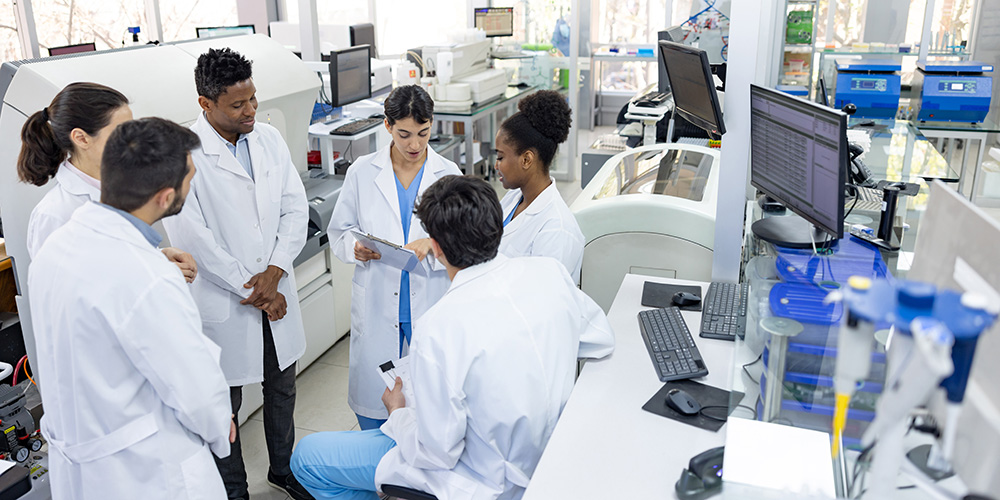The importance of lab rotations
If you’re headed to graduate school this summer or fall, you are probably already thinking about what kind of research lab you want to work in. Choosing the right lab can affect your happiness and success throughout your studies (no pressure, right?). So, how do you make this decision?
Rotations as trial periods
Most programs include lab rotations as part of the lab selection process. A rotation is time spent in a specific research lab to try it out. The time span varies among programs and is typically several weeks to a few months. My lab rotations in grad school were eight weeks, but students could choose to extend a rotation for a few extra weeks.

During these rotations, students can learn about the research projects the lab focuses on and about the lab culture. Most of the time, you will get a specific project to work on during your rotation. Because the rotations are short, these projects tend to be small-scale but can still be a good introduction to the research and techniques the lab routinely uses.
My program required us to do three lab rotations before we could pick the lab we’d join, but the number and length of rotations varies among programs. You might be able to do additional rotations if you aren’t happy with your first few.
Picking lab rotations
A rotation is the most valuable tool for picking a lab that is right for you. A firsthand look at how a lab operates is a much better indicator of how you will like the lab than reading about an investigator’s research on their faculty page.
The first thing to consider when picking rotation labs is funding. My program only allowed us to rotate through labs that had guaranteed funding for most of the time of our graduate studies. You might want to talk to your program coordinator or director prior to reaching out to rotation labs to confirm they have the funding or space to take a new student.
Your program may also have informal meetings where investigators who are looking for new students can talk about their research and answer questions. This is a great way to learn about rotation opportunities you may not have considered.
This brings me to my next recommendation — keep an open mind. You may go into graduate school thinking you know exactly what you want to study, but the lab environment can carry just as much weight as the research topic (if not more).
I was sure I wanted to research Alzheimer’s disease and picked my first rotation based on that. Despite the research, I realized it wasn’t going to be a good fit. I didn’t enjoy the investigator’s management style and didn’t think the passion for the research would be enough to carry me through the years I’d be working in the lab.
My second rotation was in a microbiology lab doing research I had no background in, but I decided to pursue it on the recommendation of an older graduate student. I loved this lab, and ultimately joined it for my graduate studies — but I never would have picked it on my own had I been focused only on doing Alzheimer’s research.
Learning from rotations
What you learn from your rotations can help you decide what lab to join. I recommend paying attention to the lab culture during your rotation. Observe how the investigator interacts with the lab members and with you, and how your rotation lab-mates interact with each other. After all, these will be your colleagues and mentor, and you can learn a lot about work–life balance and expectations before joining.
Also, try to get a sense of the professional development opportunities available to students in the lab and whether they align with your career goals. Some investigators will have more connections within or outside of academia, and that could help set you up for your next step, whatever it may be.
Lastly, consider the research — are the projects interesting to you? Are the techniques something you can manage? If you know you don’t like some of the day-to-day research tasks, the lab might not be a good long-term fit.
Taking all this into consideration can help you find the best lab fit for you.
Enjoy reading ASBMB Today?
Become a member to receive the print edition four times a year and the digital edition monthly.
Learn moreFeatured jobs
from the ASBMB career center
Get the latest from ASBMB Today
Enter your email address, and we’ll send you a weekly email with recent articles, interviews and more.
Latest in Careers
Careers highlights or most popular articles

From humble beginnings to unlocking lysosomal secrets
Monther Abu–Remaileh will receive the ASBMB’s 2026 Walter A. Shaw Young Investigator Award in Lipid Research at the ASBMB Annual Meeting, March 7-10 in Washington, D.C.

Chemistry meets biology to thwart parasites
Margaret Phillips will receive the Alice and C. C. Wang Award in Molecular Parasitology at the ASBMB Annual Meeting, March 7-10 in Washington, D.C.

Decoding how bacteria flip host’s molecular switches
Kim Orth will receive the Earl and Thressa Stadtman Distinguished Scientists Award at the ASBMB Annual Meeting, March 7–10, just outside of Washington, D.C.

Defining JNKs: Targets for drug discovery
Roger Davis will receive the Bert and Natalie Vallee Award in Biomedical Science at the ASBMB Annual Meeting, March 7–10, just outside of Washington, D.C.

Upcoming opportunities
No matter where you are in your career and what future path you aspire to, everyone needs leadership skills. Join ASBMB for practical strategies for building and practicing leadership skills.

Close out ASBMB 2026 with a bang
The closing reception of the 2026 ASBMB Annual Meeting will be held at the Torpedo Factory Art Center in Alexandra, Virginia.

